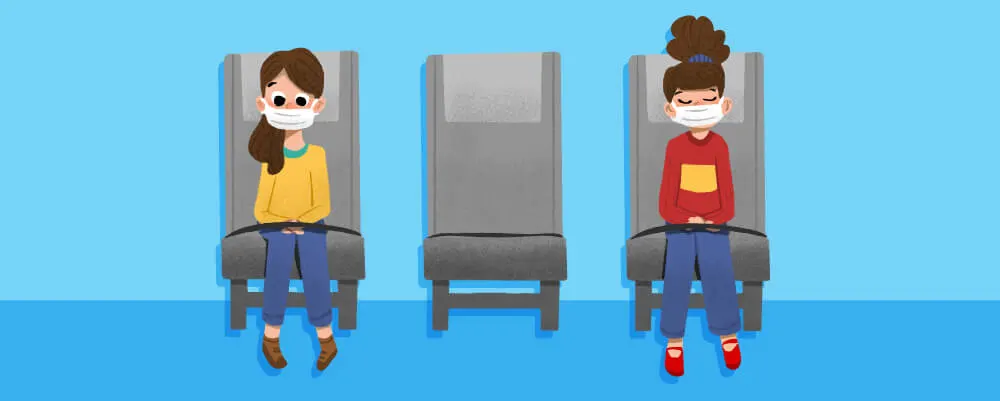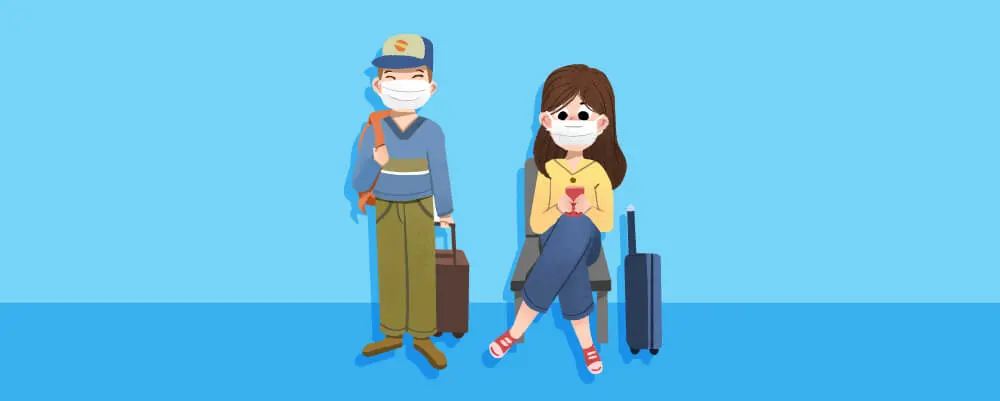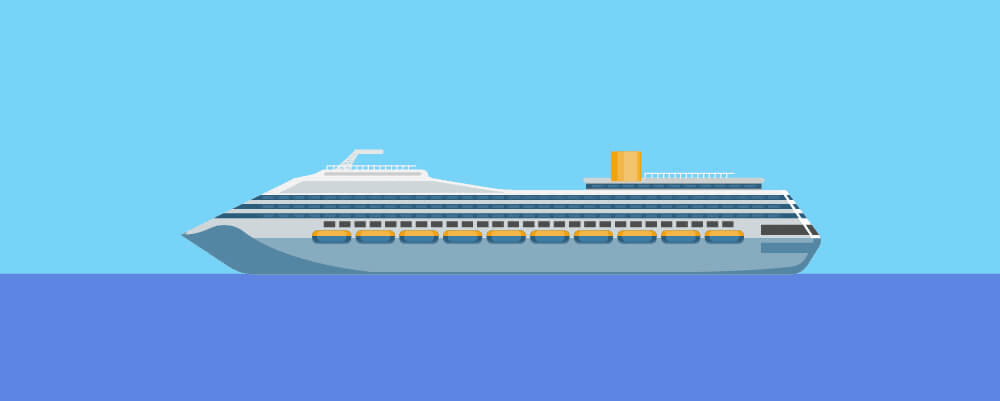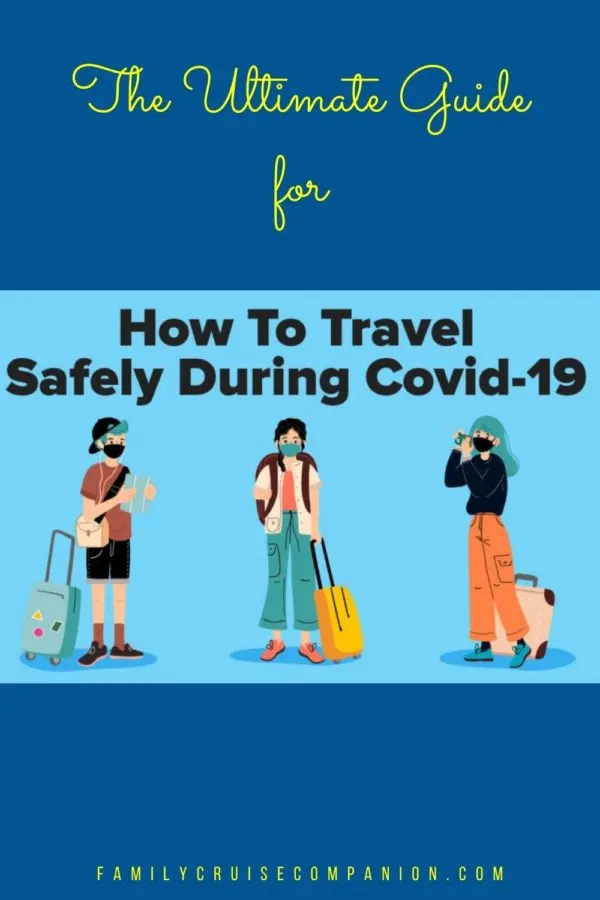Introduction

Of all the industries affected by the Covid-19 pandemic, travel was one of the hardest hit. As the virus spread throughout 2020, countries that varied in lockdown intensity were united in restricting international travel. Even where travel was possible, only a small handful of people wanted to risk traveling abroad or didn’t want to contend with some of the precautions in place.
Note: Content updated as of February 1, 2022.
Now that we are getting a handle on the pandemic, it is now possible to travel safely. The travel industry is firing back up and people are more willing to move around. Many restrictions are being lifted, now that vaccination programs are in place and have largely run their course, with mask-wearing optional in some areas.
Naturally, the travel sector is full of restrictions and precautions to avoid the continued spread of Covid-19. With that in mind, here’s our guide to traveling safely during this pandemic. Below we have covered the following:
- Tips For Travelling During Covid-19
- Before Travelling
- Changes To Travelling On Cruises During Covid-19
- Tips For Staying Safe On A Cruise During Covid-19
Between these four parts, you’ll learn how to travel during the pandemic along with how to stay safe on cruise ships, arguably the hardest ones to avoid contracting the virus if somebody around you is infected.
Given the topic at hand, we’re delving into the laws and policies of governments and private travel companies, along with medical information related to the spread of Covid-19. We’ve linked to sources and supporting materials where possible, so you can be sure you’re getting accurate information.
With that covered, let’s start off with some general tips that will keep you and your loved ones healthy during pandemic travel.
Tips For Travelling During Covid-19

No matter how you’re traveling in 2021 2022 and the foreseeable future, there are three things you should do to keep yourself safe and healthy. Even if you’ve had Covid-19 or you don’t expect it to hit you hard, you should still avoid getting sick from a breakthrough case or from other diseases. Or, from new, unexpected variants as we have seen with Omicron. After almost two years of intermittent lockdowns, basic flu cases and colds are enough to sweep some people off their feet!
Wear Face Coverings When Possible
If you are wearing a face covering, you are typically more protected than somebody who wears nothing. Of course, this depends on what the face covering is and what material it’s made from.
The CDC guidelines on mask-wearing detail what types of masks are appropriate and which ones are not. Note that CDC guidelines and recommendations have changed in the past, and are still subject to some change, but the issue seems to have settled with these points remaining the same:
- Wash your hands before putting on the mask and after taking it off.
- Masks need to cover your mouth and nose, with no gaps for breath to escape.
- Masks can stop you from spreading Covid-19 to other people.
- Masks can stop other people from spreading Covid-19 to you.
- Masks may not stop the viral spread if physical contact is established.
- Do not touch the mask or your face.
- Dispose of or wash the mask after you’ve worn it once, it may be contaminated.
- Different businesses, counties, states, and nations all have different laws, guidelines, and recommendations on when to wear a mask.
That last one is important to keep in mind. You should know the score for your local area and what they expect of people when outdoors. You should also research your method of travel, the travel provider, and the target destination so that you know what precautions to take.
Some destinations have a more laissez-faire attitude to mask-wearing while others mandate it by law, and many fall somewhere in between by strongly recommending it in certain contexts. And, in some places, private institutions may have stricter requirements than what is (or is not) mandated by law.
If you’ve got some tourism planned, keep in mind that the more popular destinations will have stronger mask requirements. This is because they see more foot traffic and larger crowds, so they’re a larger vector for Covid-19 transmission. Going to a distant campsite for some hiking, however, may not require you to wear a mask while you’re there.
Even if you don’t anticipate mask-wearing at your chosen destination, you should still prepare for the trip. Many providers will ask that you wear a mask and many will refuse service to those that don’t.
The best-recommended masks are N95 respirators that filter the air or surgical masks that block the micro-droplets that are discharged in your breath. For a long time, N95 respirators were expensive and in short supply for that very reason. But availability has recently improved. Also, experts have determined that two other types of mask over heightened protection near that of N95s, and those preferred alternatives are widely available: the KN95 and KF94. If you can’t get these, other options include:
- Multi-layered cloth masks that block light when held up to a light source and are secured to your face via nose wire. (Note: In January 2022, the CDC announced that cloth masks do not protect against Covid as effectively as other masks.)
- Disposable masks with a nose wire and woven with multiple layers.
- Any other alternatives that are labeled as meeting ASTM F3502, Workplace Performance, or Workplace Performance Plus
Acquire Travel Insurance If Possible
If possible, you should try to get travel insurance. Like other insurances, this is financial protection against costs that are unforeseeable or hard to prepare for. The only thing worse than unexpected costs is the ones that happen abroad when you’re away from home and other support networks that you can rely on.
Here are the main things travel insurance can cover:
- Trip cancellation or costly interruptions in the schedule.
- Loss of baggage and personal effects in transit.
- Medical coverage with foreign healthcare services.
- Coverage for injuries or losses from flight accidents.
- Coverage for accidental death during travel.
- Evacuation from travel destinations and repatriation to the traveler’s home country.
Naturally, the insurance is sold in different packages that vary in coverage. The more expensive packages will ensure you and your loved ones’ safety while cheaper plans will just cover belongings and minor inconveniences.
Shop around to find the best plans for you, that gives you coverage while also being easily affordable.
Consider Getting Fully Vaccinated
As it stands right now, travel becomes a whole lot easier when you are fully vaccinated. The problem is that “fully vaccinated” can mean different things to different places, now that we’re seeing booster shots offered across the world. Some businesses and travel providers may ask that you’ve had booster shots to travel and access certain services in the future.
Part of traveling during the pandemic is keeping up to date with changes in vaccination requirements. As we’ll cover later in this guide, the key is knowing what your travel provider and travel destination want from tourists. By being vaccinated, you reduce the number of hurdles required before travel and you just need to follow mask and social distancing requirements.
Current CDC guidelines advise travelers to pursue pre-departure testing before leaving for their destination, even if they are fully vaccinated. You may also need to take a Covid test at the end of your trip. Testing positive will mean you need to quarantine, either in your home country or overseas, and you’ll need to consider lodging costs and other costs associated with quarantine. If testing positive before your travel, your travel plans will be affected. Likewise, there are border closures and other disruptions that can unexpectedly put an end to your travel plans before they properly begin.
If you aren’t vaccinated due to medical, religious, or personal reasons, then travel may be harder for you. International travel will be especially difficult, though some travel services still allow travel as long as you provide proof of a recent negative Covid-19 test. The CDC travel guidelines have more details on unvaccinated travel:
- Get a viral test for Covid-19 1-3 days before your trip.
- Follow mask requirements where applicable during travel.
- Practice social distancing and hand sanitizing measures.
- Get another viral test when you return from your trip.
- Stay home and quarantine for a week after your trip, too.
- If testing positive, isolate yourself from others and follow your local process for notifying relevant medical authorities of your case.
Fortunately for those unvaccinated, travel companies are competing to win over audiences and recover after a rough year in 2020. There are still travel opportunities for some unvaccinated, typically due to certain conditions or circumstances.
If you aren’t vaccinated due to other reasons, like missing your original vaccination date or minor inconveniences with the rollout process, then consider getting vaccinated to keep you healthy and make travel easier.
Before Traveling

With those three tips in mind, there are still other things you need to do before you travel. Let’s go deeper into some of the logistics that we skimmed over, for those who haven’t traveled before or are unaware of how to prepare for a post-pandemic journey.
Along with following mask requirements, getting insured for travel, and getting vaccinated, you should have these four things arranged before you travel.
Identify Vaccination Requirements
First, you should find out what vaccination requirements are for your trip. If your destination requires vaccination, either through government mandate or private business policy, then you won’t be able to go there without getting the shots. In those cases, you should get vaccinated or find other destinations that are easier for you to attend.
Then you need to identify the vaccination requirements of your travel method. We have more on those travel methods below. Even if your destination doesn’t demand vaccination, you may need to get vaccinated to take the available means of travel to those places.
As we have cautioned about above, the standard for vaccination can and has changed from the perspective of some businesses. There are several different accepted vaccines too, so it’s best if you get a vaccine that’s internationally recognized. In most areas, you are considered fully vaccinated if:
- You have had a single-dose vaccine and it has been fourteen days.
- You have had both doses of a double-dose vaccine and it has been fourteen days.
- You have had two doses of two different compatible vaccines and it has been fourteen days.
- You received active Covid-19 vaccines as part of AstraZeneca or Novavax trials and it has been fourteen days.
As we mentioned earlier in this guide, booster shots are being rolled out and so they may be required going into the future to fall under the ‘fully vaccinated’ category for travel purposes.
Identify Risks Of Severe Illness
When organizing your travel, you should remember that the Covid-19 vaccine isn’t the only shot around. All over the world, there are many diseases and illnesses that you may not be vaccinated or inoculated against. Travel vaccinations are typically available for serious diseases such as:
- Yellow Fever
- Typhoid Fever
- Cholera
- Polio
- Diphtheria
- Tetanus
- Hepatitis A
- Hepatitis B
- Meningitis
- Rabies
- Tuberculosis
- Japanese & Tick-Borne Encephalitis
Some of these will be necessary and others may depend on where you’re traveling. That’s why you should research your travel destination to figure out which specific conditions you may need to protect yourself against. For example, a visit to East Asia calls for protection against Japanese encephalitis more than yellow fever, which is more common in Africa and South America.
Identify Destination Requirements
As we have touched on several times, you should also check the requirements of your destination. Nobody wants to navigate the current travel situation only to get turned away at your destination because you lack a certain document or have no proof of your good health.
Identify Your Travel Method
One of the most important considerations, before you travel, is how you plan on doing it. The options available to you depend on where you are. You can’t get to Hawaii by car, for example.
Your chosen method of travel will change many of the requirements we’ve talked about above, from vaccine and mask policies to which insurances are available.
When you are deciding on a travel method, you will have four main options:
Car
While convenient for those who can drive, you cannot drive long distances or drive over a body of water. You’re also personally responsible for fuel and repair costs for your vehicle.
Cars are also the easiest to get around with during the pandemic. You only need to worry about borders between states or areas where mask-wearing regulations may change. Even then, you won’t need to wear a mask when driving around in your car and you should worry more about destination requirements than the travel itself.
Plane
The fastest way to travel, plane flights have the shortest travel time but often involve hours of unstimulated sitting, which can make the journey itself a drag. You’re also in an enclosed space with recycled air, allowing viruses like Covid-19 to spread easier.
Since January 29th, 2021, the CDC and the TSA have ordered that masks be worn during embarkation, disembarkation, and the duration of travel with American airline companies and other modes of public transportation. When traveling internationally, most airlines also require either proof of vaccination or a negative test so you can travel without transmitting Covid-19.
As for international airlines, the Lufthansa Group has introduced mandatory mask-wearing with exemptions on health grounds in a few cases. The vaccinated are still obliged to wear face masks, as do staff who are also undertaking a new hygiene policy to keep airline workplaces uncontaminated.
Train
While travel speed depends on the type of train, you can only move along rigid tracks running across each continent, routing through popular urban centers and neglecting the more rural parts of the world.
Railway requirements change depending on where you are. You should practice mask-wearing and hand-washing, as usual, because it is mandated in that CDC order we mentioned above. Federal law requires mask-wearing onboard all trains regardless of vaccination status, and Amtrak strictly enforces that law.
The companies themselves have also stepped up cleaning and disinfection, cut seating by 50%, and demarcated social distancing through stickers in each carriage in response to the crisis. Many also increased filtration to stop everybody breathing the same air while also favoring contact-free payment over paper notes.
As you can imagine, the train situation is different between the US and countries within Europe. Europe is much more complex since there are no overarching federal laws, there are many national and even regional specifications instead. By wearing a mask and practicing the hygiene standard of the pandemic, you should be acting in accordance with most European national laws. Keep proof of vaccination or a negative test for long-distance journeys. From there, you just need to follow your railway company’s specific demands. For more information about train travel in Europe, you can visit the Trainline website.
Like with plane travel, your travel plans are subject to change due to changes in Covid-19 regulations. We’d advise you to pursue flexible tickets or ones that you can cancel without losing money.
Cruises
Great for intercontinental travel, cruises are common for tropical journeys across the equator and are essentially hotels, spa resorts, and malls all contained on one ship.
Of course, those ships present an opportunity for Covid-19 to spread amongst seafaring populations. The rest of this guide details how the cruise line industry has changed and what you can do to avoid Covid-19 when you’re on a cruise.
Changes To Travelling On Cruises During Covid-19

Cruises are a special case when it comes to post-Covid-19 travel. Not only do travelers sleep and spend multiple days on cruises, but they’re also much larger than any train or plane and you can’t leave for long periods between ports.
Due to those conditions, cruise ships played a part in the early days of the pandemic. The British Diamond Princess was the first ship to get infected, where it was then quarantined in Japan. It has since been studied. As 2020 progressed, more than 40 cruise ships had cases onboard and the industry was crippled. The CDC even issued a no sail order that stopped cruise travel for much of the year, from March to September of 2020.
Now that things are opening up again, several changes have been made to the cruise line industry. The CDC is operating under conditional sail orders that allow cruises if they meet certain conditions. (Update: The CDC conditional sail order expired January 22, 2022.) Let’s take a look at the six main changes here.
Vaccination Requirements
Unsurprisingly, the cruise line industry also requires vaccination in most cases. The exact policy differs between companies, as usual, but many lengthy cruises now require vaccination because it’s much easier to catch the virus. You may be able to get away with a speedy train or plane ride but, with a cruise, you live on the ship for a few weeks.
Cruise line companies require 100% vaccination for the crew and passengers. Initially, more family-oriented cruises made exceptions for under 16s and under 12s, but the policies regarding kids have evolved as vaccines have become available to children as young as five years old. Now, virtually all major cruise lines that are currently sailing require guests aged 12 and over to be fully vaccinated. (See, for example, Royal Caribbean.) While others have a stricter policy requiring all vaccine eligible guests to be vaccinated – which at this writing, means guests aged 5 and older. (See Disney Cruises.) Certain countries, and the ports within them, are placing restrictions on ships carrying too many non-vaccinated passengers, further incentivizing a high vaccination rate for inbound cruises.
Where exceptions exist, they are medical-based and may be capacity controlled, meaning that only a certain number of unvaccinated individuals are allowed onboard. Otherwise, expect vaccination to be mandatory for those who are over 12. And, we will likely soon see that requirement expanded to younger kids. Alongside full vaccination and proof of vaccination, a negative PCR or antigen test is required for embarkation.
You can find a breakdown of vaccination requirements for major cruise line companies below:
- Carnival Cruises
- Royal Caribbean
- Norwegian Cruise Line
- Disney Cruise Line
- MSC Cruises
- Celebrity Cruises
- Holland America
- Princess Cruises
- Cunard
Onboard Health Practices
Of course, vaccination doesn’t mean the virus can’t spread onboard. To reduce the spread and keep everybody safe, all cruise lines are now implementing updated onboard health practices that minimize virus-yielding contact between customers.
When staying on a cruise ship, guests are encouraged to wash their hands and use sanitizers, both of which are made widely available in public, high-traffic areas. Proper health practices are presented through announcements, ashore guidance, onboard literature, and the company’s associated smartphone app. They’ve also axed self-service meals and stepped up cleaning efforts.
As for masks, they are to be worn at terminals and during embarkation and disembarkation. On the ship itself, they’re typically required for indoor entertainment centers, stores, and elevators. Some cruise lines, like Carnival Cruises, demand this for all guests regardless of their vaccination status. Others, like Royal Caribbean, have events for vaccinated people where the typical mask rules do not apply. (Update: Royal Caribbean has suspended the vaccine-only events/venues. Masking policies now apply to all guests.)
More Social Distancing Rules Onboard
The aforementioned health practices won’t work well unless social distancing rules are followed. That’s why every cruise line is enforcing the social distancing guidelines that we’re well acquainted with at this point. Mask up and try to stay six feet away from people at most times. You can ditch the mask if you’re outside in most places, where you have less chance of catching the virus.
More Ventilation Onboard
While it was first thought that Covid-19 was mainly transmitted through contaminated surfaces, it’s the air that we breathe that poses a bigger threat. One of the main spreading factors of Covid-19 is water droplets in the air. This doesn’t mean the virus is airborne but, if you’re in an enclosed space with somebody, you may inhale contaminated droplets and get the virus.
All over the travel sector, including cruises, efforts have been made to put ventilation systems in place and upgrade pre-existing ones. These upgraded HVAC systems cycle out bad air that’s contaminated with Covid-19, making enclosed spaces safer for the people in them.
Some Experiences Available Only For Vaccinated People
Where unvaccinated people can still travel by cruise, there will still be experiences that only vaccinated people can take part in. These are typically larger social gatherings where Covid-19 transmission is a distinct possibility.
If you’re on a cruise, there’s every chance that you’ll be stopping at different countries. When docked, it’s common for cruise-goers to disembark and check out the goods and services offered by the tourist destination. If you’re unvaccinated, you may not be able to comply as per Covid-19 laws or regulations.
A great example of these regulations is shore excursion policies. These are the policies that manage how ship-sponsored excursions take place and who is allowed to participate. Where many experiences are available for vaccinated people only, some cruise lines demand that the unvaccinated purchase tours through them so that they can be supervised and adequately isolated from the rest of the population. This is common for family cruises, where minors are not yet vaccinated.
Better Medical Care Onboard The Ship
Even when all the precautions are taken, travel companies still need to prepare for cases of Covid-19 and other illnesses. While there isn’t much responsibility for buses or trains, cruise ships need to have better medical care onboard to treat their guests.
Cruise line companies have upgraded or expanded their retinue of doctors, nurses, and other qualified medical professionals who can deal with urgent medical situations as and when needed. This includes the treatment of Covid-19 symptoms that go beyond the typical pains and into incapacitating or even life-threatening situations. Naturally, they have a laundry list of equipment so that they can work to the highest possible standards outside of a land-based hospital. This allows customers to have the same standard of care, even in the middle of the world’s seas.
Since unvaccinated individuals are more at risk from serious complications related to Covid-19, some cruise lines are also demanding that unvaccinated guests have travel insurance. This means that, if more serious treatment is required, the cruise line company isn’t responsible and related costs are covered.
Checking The ‘Covid-19 Status’ Of The Cruise
Before you commit to any cruise, you should check the Covid-19 status of your local ships. These are indicated through a color scale.
During the onset of the Covid-19 pandemic, the Center for Disease Control and Prevention brought in a system that color-coded cruise ships based on their status. There are five tiers to this system, those being green, orange, yellow, and then red. These color categories are formulated after processing surveillance data and CDC investigations toward suspected infected ships. Here’s a rundown of what these colors mean:
- Green: No confirmed or possible Covid-19 illnesses
- Orange: Some reported cases but beneath the CDC’s investigative threshold.
- Yellow: The ship is at the investigation threshold, either due to staff cases or because a local health department has flagged the cruise.
- Red: The ship is above the threshold for Covid-19 cases and is subject to delays or cancellations, depending on the outcome of the CDC investigation.
Tips For Staying Safe On A Cruise During Covid-19

After reading the above, you may be unsure about going on a cruise during Covid-19. Now that we know more about Covid-19 and how it spreads, we know that the risks can be substantially reduced if you take the right precautions.
If you’re thinking of planning a cruise trip any time soon, keep these seven tips in mind.
Get Vaccinated For Covid-19
If it isn’t obvious enough already, getting vaccinated is ideal for traveling via cruises. Unlike driving in a car or train, or flying on a plane, you will typically spend longer on cruises with larger numbers of people and will expose yourself to more surfaces and air environments that could be contaminated with Covid-19.
Think of cruise ships like hotels and malls that are often isolated in the water. This means you’re more exposed to the virus but you’re also less able to get help if you need it. As we’ve covered, cruise ship companies have already started building medical staff for Covid-19 and other illnesses but being vaccinated will keep you safe.
While vaccinated people can still present with Covid-19 via a breakthrough infection, it greatly reduces the chances of symptoms becoming incapacitating or life-threatening. This is especially important if you have comorbidities or you’re reaching your golden years, where Covid-19 poses the biggest threat to you.
Understand Safety Protocols
Before you book any journeys on the high seas, you should be intimately familiar with the safety protocols you’ll have to follow. Remember, you will need to consider:
- The safety protocols in your home country for initial travel purposes.
- The safety protocols of your chosen method of travel to the ship, like a car, train, etc.
- The safety protocols of your chosen cruise provider when onboard the ship.
- The safety protocols at each port, following the different countries, if the cruise spans international territory.
That’s a lot to keep track of, so it may help to pack a notepad and make some notes on the requirements of each. In general, you’re covered if you’re vaccinated, you keep a few disposable masks ready to wear, and you practice social distancing and frequent handwashing wherever it’s possible. In times like these, your travel journeys may require more preparation.
Consider Smaller Ships
When preparing for a cruise, you should consider whether a smaller ship would be appropriate for your travel party. Whether you’re concerned about the virus itself or you just want to avoid many of the inconveniences that come with post-pandemic travel, smaller ships are filled with fewer people. It may sound counterintuitive to seek out a smaller ship but, with fewer people, you can actually get more square footage per person than the larger, more commercial cruise lines.
It also makes it a lot easier for the cruise company too. Since they have to wrangle fewer customers, those on smaller cruise services can even expect in-suite dining brought to their door. If that sounds ideal for you and your budget can afford it, investigate ships that have less than 500 passengers.
Of course, you may lose out on certain amenities and services if you go for a smaller ship. For instance, most small ships do not have extensive kids’ programming or may have limited spa services. The smaller ships may not dock at some of the tourist-friendly locations that larger ships dock at, too. (But, conversely, they have access to interesting ports that large ships can’t access.) As always, it’s about finding a compromise between the safety and simplicity you get from a smaller cruise and the entertainment that comes with larger cruises.
Choose Destinations With Natural Social Distancing
Not all destinations are made equal. As we’ve alluded to earlier in this guide, more urbanized locations that are full of tourist traps will require very strict adherence to vaccination/testing, social distancing, and mask-wearing requirements. This is because they’ll see thousands, perhaps tens of thousands, of visitors during the day.
However, if you choose a destination that’s less popular and has plenty of rural entertainment, you can often participate in social distancing naturally and avoid some of those other inconveniences. Sometimes you just want to go downtown, in which case you’ll need to tough it out, but sometimes you can find entertainment away from the bright lights and high infection rates of the city.
If you want to really do your due diligence, you can use news reports and heat maps online to scout infection rates. The aggregated information available depends on your country, not everywhere has this data, but it can be invaluable when planning a cruise. By knowing where most cases of Covid-19 are, you can avoid the worst of it and stay healthy throughout your travels.
Limit Time Inside, Go Outdoors Where Possible
Take the same mindset we just talked about and bring it down to a local level. Instead of focusing on more rural and lax travel destinations, start trying to spend more time outdoors at those events.
This helps you avoid those tight, interior spaces where Covid-19 seems to spread fast. It’s also more convenient for those who don’t like crowds or are concerned about catching the virus.
Of course, you can also go outside while staying on the ship. There’s no shortage of pool decks and promenades that you can frequent while still following distancing guidelines. You can also have fun with outdoor activities onboard, where the risk of catching Covid-19 in the open air is drastically reduced.
Choose Other Options To Group Excursions
A common practice in cruise travel is the excursion. This is where the cruise ship docks at a port of call and then everybody disembarks and spends some time in a new destination. When this happens, everybody may rush towards the closest and most tourist-friendly locations, though this can also be a breeding ground for Covid-19.
If you’re taking part in excursions and want to minimize your chance of getting sick, you should travel in smaller groups and opt for activities that keep you outside, like hiking or some beaches. Remember our previous tips about natural social distancing and limiting your time indoors and put these into practice when finding alternate shore excursion activities. With some specialized outdoor activities, they may be more expensive than other tourist activities, so that’s something to keep in mind.
Packing Tips
Lastly, you’ll need to pack for your cruise journey!
Pack everything you’d pack for a pre-pandemic cruise journey. But then, there’s a little more you should pack to make sure you’re fully prepared for traveling during Covid-19. You should pack:
- Sufficient face masks for the duration of your journey with back-ups for unexpected changes.
- Personal sanitizing products, especially a disinfectant with over 70% isopropyl alcohol, which is enough to destroy Covid-19 on surfaces.
- Relevant paperwork relating to your vaccination status and/or Covid-19 test status.
Related Content:
You should also pack for a quarantine. You may get caught in a quarantine that forces you to live off your baggage for more days (or weeks) than you initially planned. In that case, pack extra clothing and personal effects that you’ll need consistently. Make sure you pack any prescription medication too, so you aren’t left without vital medications in a quarantine situation.
Summary

Now that you know what to pack, we have reached the end of our guide on safe travel during Covid-19. Whether you’re traveling by car, train, plane, or cruise, you should have learned something about how to stay safe and avoid the hassle that comes with post-pandemic travel.
Although we obviously love cruise travel here at The Family Cruise Companion, we recognize that there are benefits and risks inherent to cruise ships that aren’t necessarily present with the other methods of travel. When putting our tips into practice, cruise travel during the Covid-19 pandemic can still be relatively simple and painless while still being lots of fun!
Keep up with the latest cruise tips and insights! Follow us on Pinterest:


